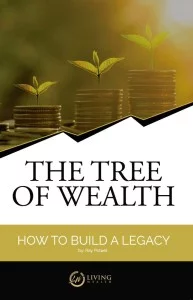In this episode, we discuss the difference between Austrian economics and Keynesian economics. And will explain how you can use infinite banking to break free from the money manipulation of the Federal Reserve.
In episode 36, we covered hyperinflation, cryptocurrencies, infinite banking, and how all of them go hand in hand. And we talked a little bit about economics.
Today, we’re going to go deeper into Keynesian economics and Austrian economics. Which one is better? Which one presents the greatest benefit for you and society as a whole? And we’ll even examine how infinite banking applies on a grander scale of economics.
Economics, Federal Reserve Money Manipulation, and Infinite Banking:
- Keynesian economics
- Austrian economics
- When a dollar isn’t necessarily a dollar
- The Gold Standard
- Nelson Nash and the creation of the Infinite Banking
- The implications of widespread Priviate Family Financing adoption
Want Financial Freedom?

Start your journey to financial freedom with this first step.
Get our 122 page eBook The Tree of Wealth here now.
Take Aways:
Episode Resources:
- Win an Autographed Copy of Ray Poteet’s Book The Tree of Wealth
- E36: Hyperinflation, Cryptocurrencies, and Infinite Banking
- E9: What is Infinite Banking and How to Make it Work for You
Podcast transcript for episode 38: Break Free From Federal Reserve
Nate: In this episode, we have special guest Ray Poteet here to discuss the importance of grandparents in the lives of their grandchildren, how they can help them grow with understanding about money and how Ray has helped his grandchildren by what he’s done with them and for them, especially financially. She’s Holly, and she helps people find financial freedom.
Holly: He’s Nate. He makes sense out of money. This is Dollars and Nonsense. If you follow the herd, you will be slaughtered.
Nate: Hi, everyone. Welcome back. Today we’ve got Ray Poteet here with us. As many of you know from last time, he’s the founder of Living Wealth and Holly and I’s mentor at IBC. It’s just a privilege to have him here. We also have Holly. Typically, I don’t know if you guys know this, but Holly and I are shooting from different locations, but today we have the whole family back together for now, so we thought we’d get a good family podcast shoot in.
That’s what we’ve got going on today, and the topic that’s been on Ray’s heart for a while is him being a grandparent and now a great-grandparent, teaching other grandparents and those who have grand parenting in their future what he’s done and what he’s learned that you can do as a grandparent. Ray, what have been some things that you want to share with the audience about your journey of learning about what it means to be a grandparent, and especially how has IBC potentially even helped you communicate with the grandkids and do things with them?
Ray: Well, first of all, the first thing I did as a grandparent was get a mentor to be a grandparent. I probably should have done it being a dad, but I didn’t. I noticed family. That’s what my mentor really emphasized to me, that you have to see it as a family rather than an individual. It put it into perspective because I hadn’t seen it.
Now that we have a business that have grandchildren working in it, I’m glad that he gave me that emphasis to see it as a family because we truly have a family business that emphasizes the ministry of IBC to not only individuals but especially for me being a grandparent and a great-grandparent, to those individuals, how they can use this tool to really create a legacy and a benefit for their grandchildren and great-grandchildren into the future that nothing else will do.
Nate: Yeah, exactly. What were you doing before IBC with the grandkids, and what changed when you started doing IBC and starting thinking more family? Before IBC, you really weren’t really super focused on family, is my thought at least. What changed when you did Infinite Banking as opposed to just doing everything else when dealing with kids and grandkids and the legacy mindset?
Ray: Well, the major thing that changed is where your wealth is parked. Wealth has to be someplace. It has to reside someplace. Before IBC, the wealth for myself and my children and grandchildren resided in stocks, bonds, mutual funds, things that I had been programmed were the place to put wealth.
Nate: Yeah.
Ray: Since IBC, I put no wealth there, and I put it all into the policies that we’ve created for our children, grandchildren, and great-grandchildren because that is the true place that it can grow and be used effectively, under the teaching that we now give the kids that we didn’t before because I didn’t know how.
Nate: Yeah. Money wasn’t a thing that was talked about a lot before IBC, but then that’s changed. I’ve been a part of it.
Ray: Yes.
Nate: I think I’ve been seeing the evolution of it. That was a mentor type of deal that taught you, “Hey, maybe we should talk about money more often.”
Ray: Yes. It sure was. Not only did we not talk about it, we stressed about it. I made sure that those individuals around me knew how stressful it was that they were making me over this thing called money because I didn’t understand it, and therefore I felt betrayed by my industry when I realized it was something that was so important that I had not even taken the time or energy to focus on it for my children, but I have had the time to share with them and talk to them about my grandchildren, which they are, of course, the parents of.
That really has been I can’t say anything but miraculous. I’ve enjoyed it so much. You’ve been able to be a part of it. The things that we have been able to do as a family unit, not just me and my children, but me, my children, my grandchildren, and now the great-grandchildren are being a part of that, especially in our family outings and at times what we can do and how we can do things, whether it is in an investment together or whether it is in a giving together or whether it’s just individualized for one of those children, grandchildren, or great-grandchild’s needs or purposes.
I don’t say a lot about it, but it has actually been one of the greatest blessings I can see. I don’t hesitate to pay the premiums because I know what they’re doing, how they’ve been used and a way of putting braces on grandkids, as well as buying cars, as well as taking trips, as well as paying for education and knowing the reality of it, that that’s staying in our family unit to be reused.
Holly: When would you say is it the most important time for a grandparent to start a policy on a grandkid?
Ray: While it’s in the womb if you could, but you can’t. We have started all the policies on our grandchildren since we’ve known about banking the 14th or 15th day after they were born. You came to the US, I think, on about the 12th day.
Holly: 14th.
Ray: 14th.
Holly: She had to be 14 days old to travel, so yeah.
Ray: Yeah, and so the day after you got here, we took an application.
Holly: Yeah.
Ray: That’s been pretty much the guideline. Nate, you’ve had two children, and those are my great-grandsons. I know I’m third in line on those, whereas before I was first or second, and that we have gotten policies for them as well because I see the same thing being passed on that the legacy from the parent to the grandparent to the great-grandparent, that they’re learning in a process that we all believe the same thing.
Like the Lord Jesus Christ, we believe he’s the most important thing to guide our lives. This is the most important thing to guide your life financially. We are in a world of money as Rabbi Daniel Lapin teaches us, and God put it as an emphasis next to love as the second most important thing he spoke about in the word of God. Literally, we have not known about it or how to use it properly because nobody sat down and told us.
Nate: Yeah.
Ray: Okay, so that fell on me, I guess, as the patriarch to try to teach my daughters and them to try to teach their husbands and you as a grandson-in-law. We do believe in it. We do use it. What the neatest part is, is to allow them to use it, the earlier, the better, to get a handle on it and sort of things. I mean I was blessed this year to watch and hear about a granddaughter that borrowed money to get a surfboard. Okay. I was blessed when I saw you buy a car and buy a house using it.
The things that we can pass on, what is really important and how to use it, the questions they ask and the misconceptions that can be cured right now rather than those times when I learned about money by trial and error and in the world. The industry I was in, even though I was working with this tool called money, it didn’t teach me what it was or how to use it properly, as I think we’re doing with our children today, our grandchildren and our great-grandchildren.
I don’t say my children a lot because if they really mess up now at this point in time, the hounds of Heaven will be after them because of how much we talk about it, discuss it, not because we’re besieged by it, but because we see the importance of it in lives and in their lives, that we’re not trying to accumulate money, but we are trying to be wise and good stewards of this gift that God has given us.
Nate: Yeah. I think what we’ll do real quick is take a quick break for a word from our sponsor, Living Wealth, then we’ll come back and maybe ask a little bit more detailed questions of Ray and what’s he actually done for the grandkids and his advice for other grandparents out there or even parents who are dealing with their children. So a quick break with the sponsor, Living Wealth, and we’ll get right back at it.
Holly: Are you tired of being stressed about money? The Dollars and Nonsense Podcast is sponsored by Living Wealth. Visit livingwealth.com/freedom to get your free Smart Money e-book and sign up for a personal wealth presentation today. Living Wealth is a family-owned and operated business, which works with individuals, families, and even businesses to slay the money stress dragon. Our clients receive individual coaching regarding wealth creation and how to create a retirement income. You’ll be enabled to have cash today and in the future.
Since 1972, Living Wealth has been committed to educating smart people on basic money principles to assist them in becoming debt-free and finally find financial freedom. Let us help set you free. Remember to visit livingwealth.com/freedom to receive your free e-book and even sign up for an individual wealth presentation today.
Welcome back to the podcast. We have special guest Ray Poteet here today. Before we left, we were talking about the importance of grandparents and passing on a legacy even to grandchildren. What are some examples of what you’ve done personally with the grandkids or even your children in regards to IBC and teaching the importance of it and making sure it’s a point in passing on that knowledge and family legacy that other grandparents or parents could learn from?
Ray: I’d say the first thing I did, I bought policies. Why? Because I believe in them. Me and my bride had from 49 years of marriage our three insurance policies my dad gave me when I got married, and they’re two-dime-a-weeks and a nickel-a-week policy. That was a quarter a week. I pay them annually. Now they’re nine bucks, but it was a lot of money to my parents.
The gifts and the way we design these programs can guarantee that our grandchildren and great-grandchildren, when I say ours, my bride’s and mine, will use a bank just for a checking account, hopefully never to borrow from as I have or to need the bank except as a tool to use it for their banking system.
Nate: Yeah.
Ray: We were able to design some things. What I say, it can be one child, $6,000 a year, $500 a month. It could be two children at $3,000 a year. It could be three children at $2,000 a year. It could be six children at a thousand. The importance is not the amount but the doing and getting into practice so that as they grow and ask questions, you’re very comfortable in saying why you’re doing it.
I mean it was during this process that I realized the way I originally started with our normal 40/60 split was totally wrong for children and correct for adults, but it was through, you might say, totally screwing up with those originally and then having to buy additional policies created the right way to try to teach them what they really have. What happened … Nate, you’re not even 30, but I’m 70.
The reality was I can see a child age 30 when he gets to Heaven telling me how bad I screwed up on his policy, so I looked at it. I think today of looking at policies I bought in the ’70s and ’80s and how well they’re performing with what I didn’t know, and I can see that those same policies are the policies I created for my children and grandchildren and great-grandchildren, and they’re looking at them.
I just see that without any question, they put in a dollar, they can have three dollars, four dollars, so the amount that they can have with no taxation is very, very important because taxes are the true destroyer of wealth. We have a tool here we can use at very small dollar amounts that can protect them from that destruction.
Nate: Yeah. As you’ve already mentioned on this podcast before, the first thing you did on every grandkid pretty much that you own a policy on, great-grandkids you do, and recently you’ve been in a group dealing with how to become a grandparent. You’ve given them advice and things. How can you help people see who are listening to this the importance of Infinite Banking as a bedrock to growing up as a grandkid and getting taught something, I mean not only providing the policy but also the education?
I mean what kind of advice would you tell the grandparents out there that they could do if they got a policy and started using it as a teaching tool?
Ray: To makes sure that the grandchild or the child is involved as early as possible. I mean really, maybe they don’t understand. I’m saying four, five, six, seven years old is not too young, but as they get older, you get to grow with them. I mean we got to see many of our grandchildren grow up every day eating at our house as they grew up and right in the next lot next to us. That’s continuing today.
We see a lot of them, is to show them and go back and experience … grandparents understand time better than kids do, and they can picture something that they had a long time ago that they wish they knew about today 20 or 30 years ago. One of the common questions I think we all get asked that are teaching IBC, “Where were you 20 years ago?”
Nate: Yeah.
Ray: “Where were you before? Why didn’t I know about this?” Well, you can see that pretty much in my face and my attitude when I was in the industry that the product we use I was in and didn’t know about it.
Nate: You knew that you had the product. You just didn’t have the process of the Infinite Banking.
Ray: Well, I had a product, but I didn’t know how to use it so it was no good. It was like having a computer and not knowing how to use it. That was me. With our grandchildren, as they ask questions and we say things to them, I think grandparents have time. I see that that’s the importance that parents don’t have today that is time with their kids, really. Grandparents can watch the kids. They can be there. They can cover for things.
Why? Because they’ve went through time. They have more wealth. If they don’t have more wealth, that’s unusual. Why? The kids have grown. 90% of wealth is created after age 50 in the United States. Why? Kids are grown up. Okay. Now that’s not as true as it used to be as people are waiting longer to have children right now. I think that’s just a cycle that will go back the other way. But what do we teach them?
We teach them how to drive. We teach them how to run on a computer. You use a cell phone, various things, but we don’t teach them about money. Yet it took money to have a car. It took money to have a cell phone. It took money to go out to eat. It took money to take them to Disneyland. The item that we needed to do all those things we forget to talk to them about.
Nate: Yeah.
Ray: That to me is the greatest joy I have right now. I have the tool to be able to teach them. The longer I’m doing this, the more amazed I am at what it can do. I mean we still haven’t touched all the things it’s doing. Every week, every month, something comes up, and we go, “Oh, we could do that.”
Nate: Yeah.
Ray: I mean I’m just seeing … like right now I made a decision to make a major investment in Arizona last week. I’m going, “Oh, I wouldn’t have ever done that if I hadn’t learned about how money works, why it works, and how important cash flow is.” I was so used to storing money. “How much can I store? Oh, I don’t want to remove that. The world might come to an end,” or whatever it was. I was very fearful of not having enough.
Now I’m more concerned if money is sitting and not moving rather than an amount of money.
Nate: Yeah, that’s good.
Ray: Very few children have the privilege of learning that. I’ve talked to grandparents that have set up huge 529 plans, have done all kinds of things but haven’t bought an insurance policy on them. What we’ve seen is we have children right now due to autism, diabetic, heart conditions, medical problems, that cannot have a policy. I’m so blessed that all our living great-grandchildren have policies.
Nate: Yeah.
Ray: If they never get another policy, they’ll be protected and their family will be protected, maybe not as much as they want, but a lot better than most families just because of what we’ve done.
Nate: One of the things that we hear all the time, especially for adults, is that it’s hard to catch Infinite Banking or we’re having to pull all these weeds out of people because they got used to living life a certain way. Then IBC came in, and it was totally different, and now they’ve got to learn to ride the backwards bicycle and relearn everything about it. But one thing I have learned just with dealing, of course, with the family that I got married into was that most of the grandkids, Infinite Banking is already a way of life.
So they don’t have to relearn or unlearn things in order to do this. A lot of people say, “Why is everyone not doing this?” Probably the answer is because their mom and dad never told them that this type of thing existed. What are you guys doing? A lot of times the same things that your parents are doing, which is just the mainstream things. As you said, I think life is way more simple using Infinite Banking, and the grandkids can catch on to it rather quickly.
It’s not as difficult to understand if you didn’t have a preexisting notion about money, and you’re going to teach them motion of money instead of money sitting.
Ray: Right.
Nate: You’re going to teach them replenishing and recapturing instead of just spending money. These principles that we know as really important aren’t normally taught. We get to go on vacation as a family together, and everyone knows how it’s being paid for and that we’re paying ourselves back for it, and that just becomes a way of life, and it’s a simple way of life that guarantees financial success.
It just guarantees it for the grandkids and everything. We know that if you want to go invest money and take risks, you can, but at least you’re guaranteed in the banking side to have success.
Ray: Yeah.
Nate: If you want to go invest in Arizona at a more volatile place, you certainly can do that, but you have this system in place to get the money back regardless. I just think it’s been great seeing firsthand what it’s like when a family teaches the kids what this is all about and introduces money concepts. Almost you’re guaranteeing they’re going to be more successful with money than most people having to learn with the school of hard knocks.
Ray: I think the thing I see … and I see a really good picture of it right now with Katie, one of my granddaughters. I told her what we need in our business and what we could do for her if she would do that, and she said, “I think I just found a new vocation.” I hope that she continues in that because we would definitely use her. She is working at the office. She’s going to school.
But the greatest school we have for her is right in our office, as she experiences. I mean right before I came here, I got a call from a lady that is celebrating her 55th wedding anniversary with her husband, who has Parkinson’s. She’s a beautiful lady, loves the Lord and loves her kids. She said, “I want to get a policy on my 55-year-old daughter and my one-year-old great-grandson.”
It was like, “Okay, here’s a daughter. Here’s a great-grandson. Quite a spread in ages. They don’t get it, but I do, and they’ll appreciate this probably when I’m in Heaven.” I was going, “They will.” If they don’t, I said she gets to remind them when they get there. It’s a tool that we joke a lot about, but I can tell you that holidays or vacations were very stressful in our family prior to banking.
I would think about what a waste of money it was, or “Why are we spending this much money, or how can we do it cheaper?”, or things we don’t have to buy when we go. That’s changed, not to be wealthy. I’m not saying blowing money. I’m saying the things that we stressed about we don’t stress about, not because, oh, we’re just throwing money away. It’s because we know we can recapture it.
You do approach things differently when you recapture rather than pay off. Everything. I mean I look at everything as cash flow now, and I see how many people suffer because they don’t have cash flow. They have storage.
Nate: Yeah.
Ray: It’s really a demon. It’s not of God. Motion is the natural law of God, and if we can teach our children, our grandchildren, our great-grandchildren that theory, they will not have the stress that many people around the world have because of this thing we call money, not because we’re rich, but we’re very knowledgeable in how it works. The word God says knowledge is power. It also says in Hosea, “My people perish for lack of knowledge.”
Well, we don’t want to perish. We want to flourish. We want to pass on the power of God’s word and how it is used even in the world of money, in this world. We’re not of this world. We’re in it, and why we should be the leaders and not the followers.
Nate: Yeah. As we kind of close this one up, if you were to go talk about just one of the grandkids and what you’ve set them up … I see you’ve got this year. But what do you really think that you’ve built? You mentioned some things about grandkids never having to go see a bank except for a convenience and if they wanted to get some money to fund their banking system or something like that.
Ray: Right.
Nate: But what is it that you’ve seen long-term? What is it that you’ve created for them that you really think … if you could paint a picture for the listeners of what you’ve done, and maybe they could try to model after it.
Ray: I think the best thing as I see it, I’ve given them a legacy why to stay a family, why to stay close to one another. We were taught to be independent. I was very not close to my brother or sister. There was no reason to be because Mom and Dad said, “You’re independent.” If anything, I’ve seen how we can be close, love one another, be close to one another, and not be separated because one has more than another or is doing better than another.
We’re still a unit, and we’re a unit because it is more powerful to be a unit. When Jacob went to Egypt to see Joseph, who he thought was dead, who went with him? His other 11 sons. They stayed a family. We don’t even see that now. God promoted family in a tribe, in a system. If anything, I guess that’s the best thing I think that banking has done for us, is kept us close together.
Nate: Yeah, it’s very easy to keep money in the family. Actually, you’ll probably learn about that in our next episode, too. We’ll have Ray back on our next episode. We’re actually going to talk about his IBC history and what he’s done and some practical things that he’s done to incorporate the family. But yeah, as you’ve said, the family has grown much closer since IBC than it was beforehand, and we’ve got some advice to give, and you’ll see that on the next episode, what Ray has actually done with his policies and how he got started with this and the history of learning about it.
Holly: I think the one thing I would just add on is that it actually has allowed you to be champions of each other. It’s not about who has more or less. It’s more about, “We’re a family, and we’re going to stay together no matter what.” You champion one another to reach that next goal and to reach that next potential, and that I think is the greatest thing, is there is a true love of knowing it’s not about who has more or who has less.
It’s about knowing that the family is going to be provided for long after my dad is gone, long after I’m gone. It’s that hope. I guess I have more hope now that there is a legacy that goes far beyond what we could have ever imagined and that it’s not a competition anymore. It’s not a one up on somebody. It’s great. You run with that, and you do that. I think that that’s even transformed, is IBC allowed us to be champions of one another and encouraging one another versus competing against one another.
Nate: Yeah, that’s great. Well, everyone, thanks for being on the show today. This is Dollars and Nonsense. If you follow the herd, you will get slaughtered.
Holly: For free transcripts and episodes, please visit https://livingwealth.com/e34









